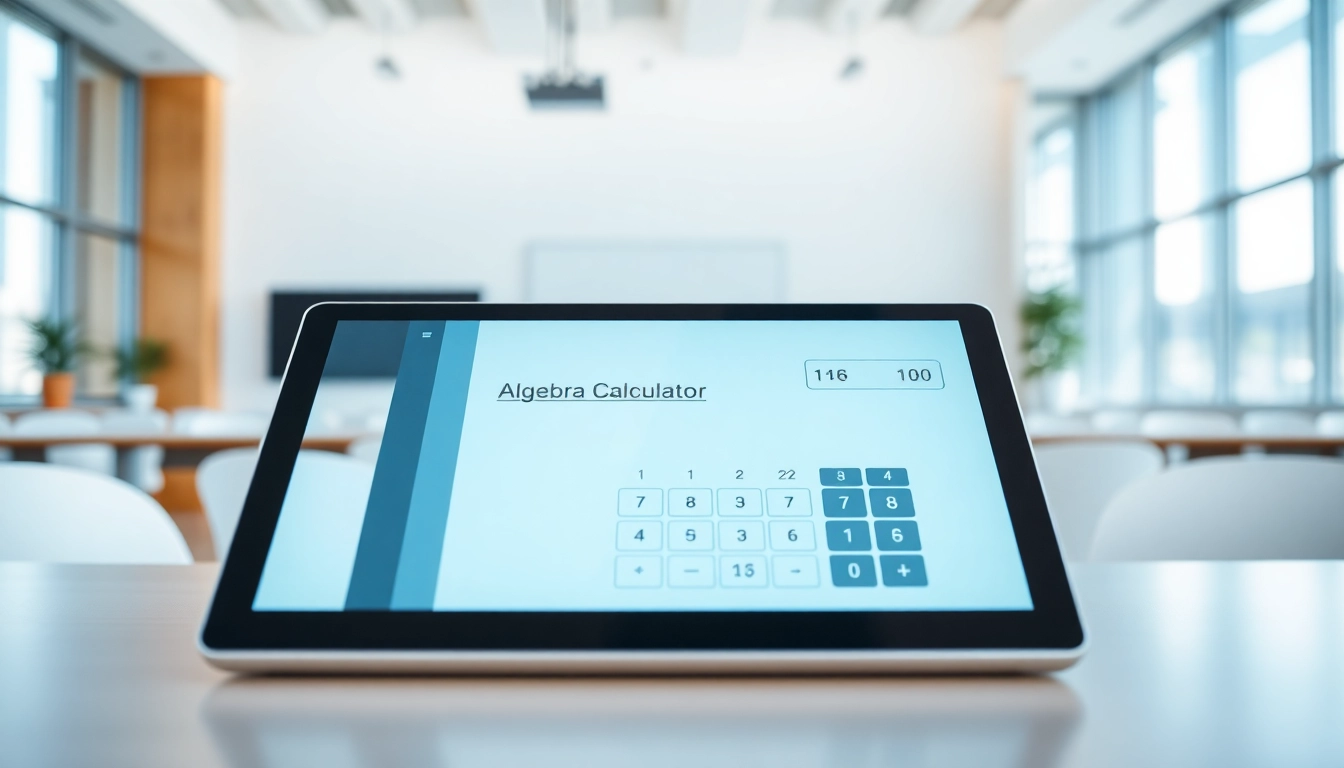Understanding the Algebra Calculator
What is an Algebra Calculator?
An algebra calculator is a powerful tool designed to assist students, educators, and anyone interested in solving algebraic equations quickly and accurately. These calculators allow users to input various algebraic expressions and receive immediate feedback on the solutions, often breaking down the steps involved in the solving process. By utilizing an Algebra Calculator, users can enhance their understanding of algebraic principles and improve their problem-solving skills.
Features of an Effective Algebra Calculator
When evaluating algebra calculators, it’s crucial to consider specific features that can maximize their utility. The following attributes are essential for an effective algebra calculator:
- Step-by-Step Solutions: Many calculators provide a breakdown of how the solution was derived, helping users understand each process involved.
- Support for Various Types of Equations: An effective calculator should handle linear, quadratic, and polynomial equations, among others.
- User-Friendly Interface: An intuitive design ensures that users, regardless of their technical skills, can input problems effortlessly.
- Graphing Capabilities: Advanced calculators often include graphing functions, allowing users to visualize equations and their solutions.
- Accessibility: Mobile compatibility, online access, and print functions can enhance the user experience.
Common Uses of the Algebra Calculator
The algebra calculator serves numerous purposes across different fields and competency levels:
- Educational Support: Students can practice solving equations and validate their answers.
- Homework Assistance: Calculators can make it easier for students to tackle tricky assignments and learn from detailed explanations.
- Professional Application: Engineers and scientists frequently use algebraic calculations in various problem-solving scenarios.
- Self-Paced Learning: Users can explore algebraic concepts at their own pace without the need for constant supervision.
How to Use the Algebra Calculator Effectively
Step-by-Step Input Guide
Using an algebra calculator doesn’t have to be overwhelming. Here’s a straightforward approach to maximize its effectiveness:
- Identify the Problem: Determine the algebraic expression or equation you want to solve.
- Input the Expression: Type the equation directly into the calculator’s interface. Be sure to use correct syntax (e.g., use ‘^’ for exponents and ‘x’ or ‘y’ for variables).
- Choose Options: If available, select specific solving methods (such as factoring or graphing) based on your needs.
- Request the Solution: Hit the calculate button to receive your results.
Understanding the Output Results
Once the calculations are completed, the results will typically be presented in a few key formats:
- The Final Answer: This is the outcome of the algebraic operation requested.
- Detailed Steps: The calculator might show how it arrived at this answer, helping users understand the methodology.
- Graphical Representation: For graphing calculators, a visual of the equation might also be provided.
Common Mistakes to Avoid
To ensure successful use of an algebra calculator, be mindful of the following common pitfalls:
- Incorrect Syntax: Always use the proper format for input; otherwise, the calculator may yield errors or misleading results.
- Misinterpreting Steps: Take time to review the detailed steps provided, as overlooking them can lead to misunderstandings.
- Ignoring Calculator Limitations: Recognize that while calculators are helpful, they cannot replace comprehension of underlying algebraic concepts.
Benefits of Using an Algebra Calculator
Enhancing Learning Outcomes
Utilizing an algebra calculator can significantly enhance students’ learning experiences by providing immediate feedback and explanations. This feature allows users to learn from their mistakes in real time, reinforcing their understanding of algebraic concepts and fostering a growth mindset towards mathematics.
Simplifying Complex Problems
Many algebraic problems can be intricate and time-consuming. Using an algebra calculator can simplify these challenges by breaking them down into manageable steps. This tool allows users to focus on understanding core concepts rather than getting bogged down in lengthy computations.
Time Management Tools for Students
The pressure of deadlines often weighs heavily on students. An algebra calculator serves as a time-saving asset, enabling them to solve problems quickly and efficiently, thus allowing more time for study, revision, or other academic pursuits.
Advanced Features of Algebra Calculators
Graphing Capabilities
Graphing functions are essential in an algebra calculator, allowing users to visualize equations and their corresponding graphs. Visualization aids greatly in understanding how changes to variables affect outcomes, as well as recognizing intersections and asymptotic behavior in more complex equations.
Solving Inequalities
Beyond addressing standard equations, effective calculators also assist in solving inequalities. Users can understand how to express solutions in interval notation and graphically represent the solution sets on a number line, reinforcing their comprehension of these mathematical concepts.
Matrix Functions in an Algebra Calculator
Many advanced algebra calculators support matrix operations, allowing users to perform calculations related to systems of equations. This feature is especially beneficial for those studying higher-level mathematics, as users can learn to manipulate matrices through operations such as addition, subtraction, and finding the determinant or inverse.
Comparing Algebra Calculators
Evaluating Different Options
With numerous algebra calculators available, it is crucial to assess different options to find the right fit. Consider criteria such as user interface, features included (like graphing and step-by-step breakdowns), and accessibility. Reading user reviews and conducting comparisons can also provide useful insights.
Price vs. Features
When considering algebra calculators, you will encounter both free and paid options. Free calculators often offer basic functionalities but may lack the sophistication of premium versions. Assess your algebra needs to determine if the advanced features offered by paid calculators are worth the investment.
Choosing the Right Algebra Calculator for You
Your choice of an algebra calculator should align with your specific needs and goals. Consider factors such as the level of complexity in the math problems you encounter, your preferred learning style, and whether you require additional learning features, such as tutorials or practice problems. By directing your search toward a calculator that suits your educational objectives, you can maximize your learning experience.
